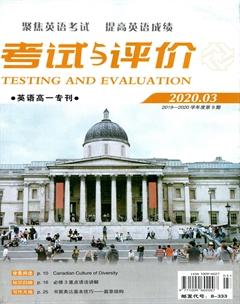过去时间表达法要点回放
王淑平
要点归纳
要点1:表示过去某个特定时间发生的动作或存在的状态,要用一般过去时,此时常与just now, yesterday, last year等表示过去的时间状语连用。一般过去时也可与today, this week, this month, this year等表示现阶段的时间状语连用。用一般过去时的时候,表示“过多少时间之后”一般用after,不用in。例如:
She suddenly fell ill yesterday. 昨天她突然病了。
Did you see him today? 今天你见到他了吗?
The day after, he came back to see me. 次日,他回来看我。
要点2: 表示过去连续发生的动作时,要用一般过去时。这种情况下,往往没有表示过去的时间状语,而是通过上下文来表示。例如:
The boy opened his eyes for a moment, looked at the captain, and then died. 那个男孩把眼睛张开了一会儿,看看船长,然后就去世了。
Tom was late. He opened the door quietly, moved in and walked carefully to his seat. 汤姆来晚了。他悄悄打开门进去,小心翼翼地走到自己的座位上。
要点3:表示过去一段时间内经常或反复发生的动作,要用一般过去时,此时常与always, never, usually, sometimes, often等词连用。例如:
Mrs Peter always carried an umbrella. 彼得太太过去老是带着一把伞。
要点4:如果强调已经终止的习惯时要用used to do。例如:
I used to take a walk in the morning. 我过去总是在早晨散步。(意味着现在不再早晨散步了)
I took a walk in the morning. 我曾经在早晨散过步。(只是说明过去这一动作)
要点5:有些句子中虽然没有表示过去确定时间的状语,但实际上是指过去发生的动作或存在的状态,也要用一般过去时。例如:
I thought you were ill. 我以为你病了。
要点6: 在条件状语从句和时间状语从句中要用一般过去时代替过去将来时。例如:
They said they would let me know as soon as they got there. 他们说只要他们一到那儿就会马上告诉我的。
He said he would not go if it rained. 他说如果下雨他就不去。
要点7: 在由if引导的条件句中,表示与现在事实相反的情况,用一般过去时。例如:
If I were you, I would study at Oxford University. 如果我是你,我就会在牛津大学学习了。(表示与现在的事实相反)
要点8: 谈到已故的人时,多用一般过去时。例如:
Deng Xiaoping was a great man. 邓小平是个伟大的人。
要点9: 在间接引语中,如果主句的谓语动词是过去时,从句的动词也要用过去时态。例如:
Tom said that he didn't know the girl in that car. 汤姆说他不认识车里的那个女孩。
Lisa told me that she wouldn't apologise to him. 丽莎告诉我她是不会向他道歉的。
要点10:在由since引导的从句中,通常用一般过去时。例如:
It's three years since he went abroad. 他出国三年了。
要点11: 一般过去时和过去进行时的区别
(1) 过去进行时往往表示动作的未完成性,而一般过去时往往表示动作已完成。例如:
David wrote a letter to his father last night. 大卫昨晚给他父亲写了一封信。(表示信已写完)
David was writing a letter to his father last night. 大卫昨晚正在给他父亲写信。(表示正在写信的过程中,不知道是否写完)
(2) 过去进行时和always连用,表示赞扬、感叹、厌恶等感情色彩;而一般过去时和always连用,表示经常或反复发生的动作。例如:
He was always changing his mind. 他总是变化无常。(表示厌恶)
He always went to work by bus last year. 去年他总是乘坐公共汽车上班。(表示经常性的动作)
(3) 一般说来,过去进行时侧重动作持续时间的长度;而一般过去时只说明过去某时发生某事,侧重说明事实。例如:
It was raining heavily last night. 昨晚下着大雨。(侧重说明下雨持续的时间长)
It rained heavily last night. 昨晚下了大雨。(側重说明下雨这一事实)
(4) 句中有all night, the whole morning等强调时间长度的状语时,谓语动词用过去进行时更好些。例如:
He was working all night last Monday. 上周一他整整工作了一個晚上。
(5) 在when引导的时间状语从句中,当when相当于while时,用一般过去时与过去进行时差异不大。例如:
I saw John when / while I walked / was walking to the station. 我步行去火车站时看见了约翰。
但当when引导的从句中的谓语动词为一般过去时时,其主句用一般过去时或过去进行时会引起时间关系的变化。例如:
When we arrived, she was making some fresh coffee. 我们到达时,她在调制咖啡。(从句动作发生时,主句动作正在进行)
When we arrived, she made some fresh coffee. 我们到达时,她调制了咖啡。(从句动作发生在主句动作之前)
(6) 有些表示状态、感觉、心理或情感的动词, 如be, have, see, hear, know, think, believe, understand等,一般不用过去进行时,而用一般过去时。例如:
I had a lot of work to do yesterday. 昨天我有许多工作要做。
巩固练习
I. 根据汉语意思完成句子。
1. 你刚才去哪儿了?
Where ______________ just now?
2. 她早早起床,提水,打扫房间,然后出去散步。
She got up early, ______________.
3. 孩提时,我经常在街上踢足球。
When I was a child, ________________ __
in the street.
4. 他年轻时每年冬天都去滑冰。
When he was young, ______________ every winter.
5. 我从乡下回来已经一年多了。
It's been over a year __________________.
6. 今天他又迟到了。
He ______________________ again today.
II. 用所给动词的正确时态完成短文。
Hello, my name's Art. I'm 74 years old and I live in a retirement community with my wife now. I (1)______ (retire) about twelve years ago from the bicycle business. I (2)______ (be) in the bicycle business for thirty-five years. Twenty of the thirty-five years I (3)______ (run) my own business. After I (4)______ (decide) to sell my business, I (5)______ (become) a draftsman. I (6)______ (work) as a draftsman for five years and then I (7)______ (retire). The retirement community I (8)______ (live) in requires you to be forty-eight years old or older. There (9)______ (be) about 800 old people living here. In the community I engage in many activities, such as oil painting, water colour painting, and stain glass projects. My major activity, however, is golf. Weather permitting, I (10)______ (play) with my friends every day. We have a golf course in the community, and since I play more often than I used to before retired, my game has improved a lot.

